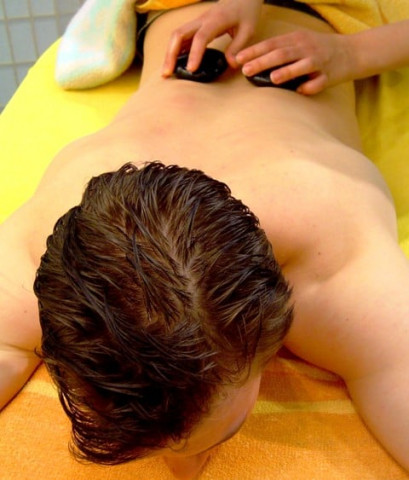6 daily habits that are killing your back
Back pain is considered as the fifth most common reason for hospitalisation and the third most common cause of surgery

Patients who got weekly massage used fewer pain killers than those who didn't get special care. PHOTO: FILE
56 per cent of people with lower-backache say symptoms disrupt their daily routines. As compiled from the book The Truth about Back Pain and Prevention magazine, here are practices you should give up for a healthier back.
Being a desk jockey
Sitting puts 40 per cent more pressure on your spine than standing. Maintaining correct posture is probably the last thing you’re thinking about when working on a deadline. Continuous sitting for long periods of time weakens back muscles.
The fix: Sitting at a 135-degree angle can reduce compression of the discs in the spine, so lean back slightly every now and then. You can do it when you take a phone call or a co-worker stops by to chat, recommends Todd Sinett, a chiropractor and co-author of The Truth about Back Pain. Make sure your office chair supports the curve of your spine. According to Sinett, your lower back should be supported, and your head should be straight, not lurching forward, when you look at your computer screen. Get up and walk around for a couple of minutes every half an hour, and take trips to get water, use the bathroom, or grab papers off the printer.
Being a smokers
New studies strengthen the link between smoking and lower back pain, and also sheds light on the causes of degenerative lumbar spine problems. The study results lend support to the theory that the mechanism of injury in lower-back pain is damage to the vascular structures of the discs and joints. Nicotine restricts blood flow to the discs that cushion your vertebrae and increases the rate of degenerative change, says Tae M Shin, a board-certified orthopedic spine surgeon at St Vincent’s Medical Centre in Los Angeles.
The fix: Quit altogether. Cigarette smoking also reduces calcium absorption and prevents new bone growth, leaving smokers with double the risk of an osteoporotic fracture as compared to non-smokers.
Skipping the gym
By improving circulation and lowering stress, just about any kind of exercise promotes back-pain recovery. “The failure to perform any exercise, particularly abdominal-strengthening exercises, may lead to poor posture and increased lower-back pain,” says Dr Nancy E Epstein, chief of neurosurgical spine and education at Winthrop-University Hospital in Mineola.
The fix: Good exercises for back-pain prevention include Pilates or other trunk- or core-strengthening activities that can increase stability in the back muscles. Cardiovascular exercises, such as swimming, walking and bicycling, are also recommended along with movements that improve flexibility.
Carrying a heavy bag
If you’re someone who habitually carries around all the essentials and nonessentials in your handbag, it is surely affecting your back. Carrying a heavy load on one side of your body causes your shoulders to become imbalanced, throwing your spine out of balance too.
The fix: Switch to a lighter bag. The Chiropractic Association recommends that your purse (with everything in it) weighs no more than 10 per cent of your body weight. You can also spread out all of your stuff between a purse and a tote, one on each shoulder, to stay balanced.
Sleeping on an old mattress
Can’t recall the last time you replaced it? Your back may be in trouble. A good mattress lasts nine to 10 years, according to the National Sleep Foundation, but consider replacing yours every five to seven years if you don’t sleep well or your back aches often. A study at Oklahoma State University found that most people who switched to new bedding after five years slept significantly better and reported less back pain.
The fix: When you do replace your mattress, pick one that’s not too squishy or hard. Very firm mattresses can increase pressure on the spine and worsen pain, say Spanish researchers. A study of 313 people revealed that those who slept on medium-firm mattresses were more likely to report pain improvement than those on firmer ones.
Being a crunch fanatic
Sit-ups and crunches may actually cause more back pain than any other exercise, according to Sinett. A strong core protects your back but crunches don’t work the ab muscles that stabilise your back. In fact, they can contribute to pain by causing what Sinett calls core imbalance, “a condition of excessive compression, which results in the spine curving forward in a C-like shape.”
The fix: You don’t have to ditch crunches entirely, but you should do them slowly and use proper form. Incorporate them into a broader core workout that also strengthens your transverse abdominus. This muscle is particularly important for a strong, steady core that supports your back, and the best way to strengthen it is with (non-crunch) exercises, such as push-ups, pull-ups and shoulder raises. Added bonus: you’ll shape your middle and beat stubborn belly fat, while improving posture and alleviating back pain.
By: Umnia Shahid
Published in The Express Tribune, September 17th, 2015.
Like Life & Style on Facebook, follow @ETLifeandStyle on Twitter for the latest in fashion, gossip and entertainment.



















COMMENTS
Comments are moderated and generally will be posted if they are on-topic and not abusive.
For more information, please see our Comments FAQ